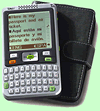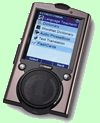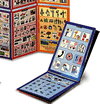Breaking the so-called language barrier
How anybody can get by in any language with just a few simple phrases, a few tricks, and a wealth of good nature
There is no language barrier. There's just a bit of a linguistic speed bump on the travelin' highway.
Memorizing a handful of key words and phrases, learning to count to two, and keen pantomime skills will be enough to survive just about anywhere. Plus, in most cities you'll find people who speak and understand enough English to get by in a pinch—though never expect it or depend upon it (read more on the polite use of English).
If you show you want to learn the lingo, locals will often be more than happy to teach you a bit.
Thank You (& Other Essential Phrases)
Web Translators
You may have noticed that you can translate any page on this site using the little Google translator in the upper right corner. Here are other free online translators:
• Google Translate
• Babelfish
• Dictionary.com
If you learn how to say nothing else in the local tongue, learn how to say "thank you."
Especially if you don't speak the language, you will be relying on the kindness of strangers (waiters, clerks, guides, concierges, and anyone you stop to ask directions) to help guide you through their country. The least you should be able to do is thank them for it.
It's polite, and it'll encourage them to help you further. I enjoy collecting native ways to say "thank you" every bit as much as collecting postcards or museum books.
After you learn "thank you," then move on to learning "yes," "no," "Where's the bathroom?" "please," "I would like," "Do you speak English?" and "one," "two," "three." (» Basic phrases in 5 languages)
Then, simply pay attention to the best teachers available: the locals all around you:
- Listen to how locals pronounce things.
- Exaggerate accents.
- Speak volumes through your facial expressions.
- Copy locals' gestures (but carefully—see the Gestures page for details).
This simple dictionary and phrase list gives you all the most essential words and phrases in French, Italian, German, and Spanish. In addition, bring along a more complete phrase guide and a pocket dictionary of English-French/French-English (or whatever language you'll need).
Using these, you can ask any question, hopefully understand the answers, and decode most of what's on a given menu (if you can't find the full name of a dish translated, often you can at least find out that the second word is "chicken," which is usually enough to go on).
Faking Fluency—Shortcuts and Hints
Let your fingers do the talking
 It's the size of a calculator, and it literally speaks 20 languages. The Lingo Xplorer 52 Talking Translator knows 1,000,000 words and 100,000 useful phrases in 52 languages. What's more, it can speak them in a native's crisp, local accent.
It's the size of a calculator, and it literally speaks 20 languages. The Lingo Xplorer 52 Talking Translator knows 1,000,000 words and 100,000 useful phrases in 52 languages. What's more, it can speak them in a native's crisp, local accent.
This makes it a much better learning tool than puzzling over the pronunciation guide in a Berlitz, and also provides a wimp's way out of actually learning the lingo. Just walk up to a hotel clerk, select the right phrase, and the Lingo will ask for the price of a double room on your behalf.
But wait, there's more! (Always wanted to say that.) It has a built-in FM radio, world alarm clock, voice recorder, calculator, calendar, metric and currency converter, and eight games for long train rides (since Mine Sweeper and Sudoku are the same in any language). My favorite phrase: "I have been bitten by a dog" in German. $249.99 from Magellan's.
(There's also cheaper Lingo Eurotalk 6-Language Translator does 360,000 words and 20,000 phrases—plus currency and metric conversions—in English, Italian, Spanish, French, German, and Greek for just $99.85.)

Or you can really upgrade into the realm of Star Trek instant translators and get the Ectaco NTL-8C iTRAVL Talking 2-Way Multilingual Language Communicator and Electronic Dictionary
.
You speak into it, and it (a) recognizes your language and what you said, (b) translates it into any of eight other languages of your choice, and then (c) spits it back out in the foreign tongue. Wow.
It knows 3,370,000 words, and 14,000 travel phrases, in English, Italian, French, German, Polish, Portuguese, Russian, Chinese, and Spanish.
You can carry on entire, albeit stilted conversations by asking a question in English, having it repeat your question in Italian for the local, then they say their answer in Italian and the iTRAVL translates it into English for you.
Oh, and it also comes with a built-in language teacher so you can actually learn some Italian, plus a talking calculator, cultural notes, time zone maps, and Fodor's restaurant, hotel, and sightseeing info on 50 major destinations on five continents and the CIA World Factbook. Did I mention it can play MP3s and audio books (some travel ones are already included)?
There is, of course, a price to be paid for this technological Wunderkind: $499.95 from Amazon.
 Or go really low-tech (and cheap: $14.85) with the laminated, foldable Kwikpoint card covered with cartoonish pictures off all the things a traveler might need—double bed, taxi, AAA battery, ice skates, pig, computer printer, toothpaste, cheese, gas station, can opener, policeman, etc. You just unfold it like a map, point at the thing you want, and throw on the local word for "please?"
Or go really low-tech (and cheap: $14.85) with the laminated, foldable Kwikpoint card covered with cartoonish pictures off all the things a traveler might need—double bed, taxi, AAA battery, ice skates, pig, computer printer, toothpaste, cheese, gas station, can opener, policeman, etc. You just unfold it like a map, point at the thing you want, and throw on the local word for "please?"
You can look up complex phrases in your Berlitz and try to pronounce them properly, but in the interests of time and clarity, you'll often find it's much more expedient to resort to a combination of charades and international pidgin.
Don't be shy about acting out what you mean.
You don't need to know how to phrase a question properly, just how to add an audible question mark by lilting up at the end of the word. Understand?
When trying to read a foreign language, don't be intimidated by the full sentence. Instead, look at all its parts. Examine each word for things that ring a bell.
Spanish and Italian are close enough when written down that you can often make out half of one if you have a good working knowledge of the other.
English is an amalgam mainly of old High German and Latin, which have evolved into modern German and the Romance languages (French, Italian, and Spanish). Look for root words that sound similar.
An example to illustrate the point:
The Italian sign says "ACQUA NON POTABILE."
Well, acqua, that's like agua, which you know from Spanish is "water."
Non, that's easy, that means "no."
Potabile, well, that's got the word "pot" in it. Hmmm. "Don't boil water in a pot?" Nah. Wait: potable. Doesn't that mean "drinkable?"
Ah, ha! Acqua non potabile. "Non-drinkable water." (Glance down at the by-now empty glass in your hand).
Uh-oh...
Look for words and word fragments you recognize and assume, within reason, that they mean what you think they mean.
Make educated guesses, make your share of mistakes, but above all, make an effort to learn what you can and to communicate with foreign language speakers on their terms.
The International Language
No, not love. I'll leave it to you to master that tongue on your own (or, rather, with the help of someone else).
And I don't mean English, either, even if that has become the de facto international language (lucky break for us English-speakers, no?). That doesn't excuse us from trying to learn the local lingo.
No, what I mean is that collection of words which, pronounced "International-style," work in most countries. Just pretend you are French or Italian and say the following words in that accent:
- Alt (stop)
- auto
- bank (pronounce it bahn-kah)
- beer (roll the "r;" sometimes add an "a" at the end)
- bus (pronounce it boo-ss)
- café
- camping
- ciao
- couchette (sleeping compartment on train; helps to mime sleeping)
- English
- hotel
- information
- kaput (broken)
- moment (universal for "wait")
- no
- OK
- pardon
- foto
- police
- post (as in -office)
- restaurant
- student
- taxi
- telephone
- terminal (as in airport)
- toilet
- tourist (of course)
Related Articles |
Related Partners
|
This article was by Reid Bramblett and last updated in April 2011.
All information was accurate at the time.
Copyright © 1998–2013 by Reid Bramblett. Author: Reid Bramblett.

